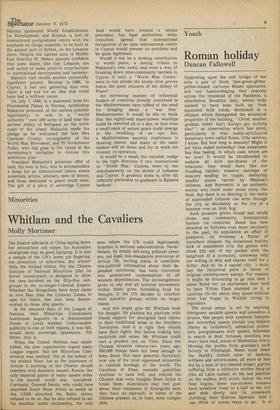Minorities
Whitlam and the Cavaliers
Molly Mortimer
The bizarre srectacle of China laying down her second-best red carpet for Australian aboriginals may be good Agitprop. It is also a sample of the UN's latest pie fingering: the protection of minorities. But whose? Only the wicked whites. For the Chinese Institute of National Minorities (like its Soviet counterpart) is designed to show the care lavished on the fifty-five subgroups in the no-longer-Celestial Empire. Whether the Mongolians have more cause to love Mao than the Crimean Tatars to care for Stalin, has now been demonstrated to those Abo guests.
In the innocent days of the League of Nations, their Minorities Commission functioned augustly in a disinterested House of Lords manner. Unfavourable publicity in one of their reports, it was felt, would deter sovereign oppressors. Till Hitler, that is.
When the United Nations was established, the new organisation copied many League organs. But the Minorities Commission was omitted. Not at the behest of the wicked West, but at the insistence of Article 2 (nothing in the Charter should interfere with domestic issues). Russia, the only imperial .gainer of many square miles in the second world war, concurred. Curiously, General Smuts, who could have absorbed South West Africa as easily as the USSR absorbed the Baltic states, refused to do so. But he also refused to set his mandate under trusteeship, the only area where the UN could legitimately interfere in national administration. Nevertheless, by steady left-wing political pressure, not legal, non-mandatory provisions of Article 73e, inviting states to contribute non-political information about their dependent territories, has been converted into pressurised condemnation of all western dependencies. The encouragement given to any and all terrorist movements within these, gives forbidding food for thought, if the UN decides to interfere with minority groups within its target states.
And this might give Mr Whitlam food for thought. He planked his platform with liberal support for aboriginal land claims to their traditional areas in the Northern Territories. And it is right they should have their rights. But before sinking into sackcloth and ashes, Mr Whitlam could cast a prudent eye on Tibet. Since the Chinese invasion twenty-two years ago, 300,000 troops have not been enough to keep down this once peaceful theocracy, now one of the most oppressed minorities in colonial bondage of the world. The Cavaliers of Khan, nomadic guerrillas, continue to raise hell, and remind the Chinese that even Genghis Khan failed to break them. Australians may feel guilt about their treatment of Aborigines past; they have no reproach, in terms of the Chinese present, or, at least, none comparable.

































 Previous page
Previous page